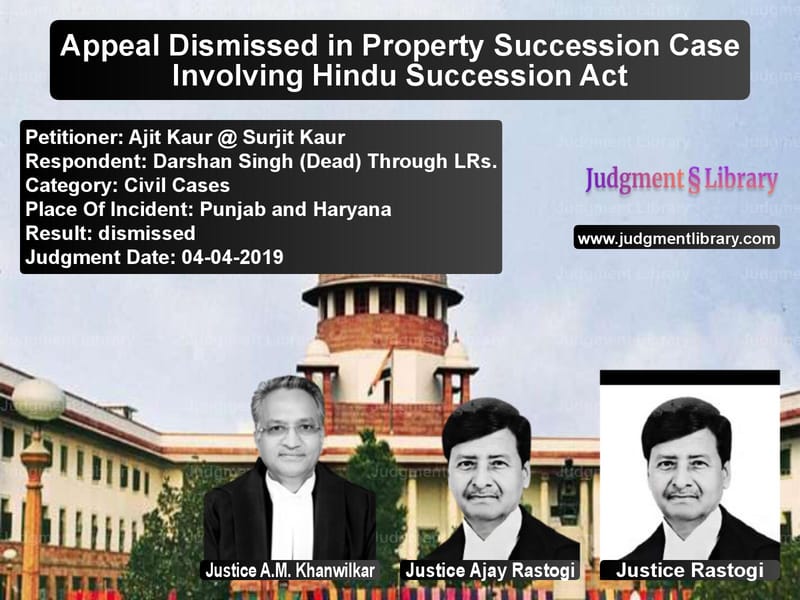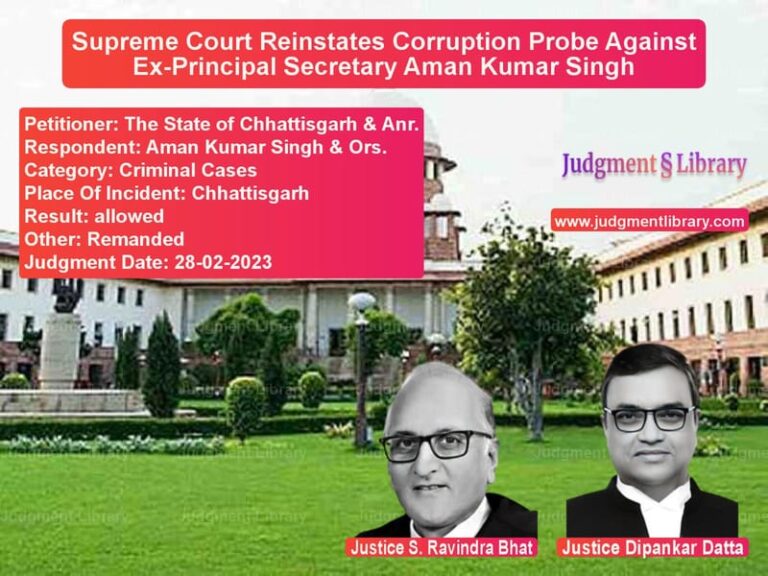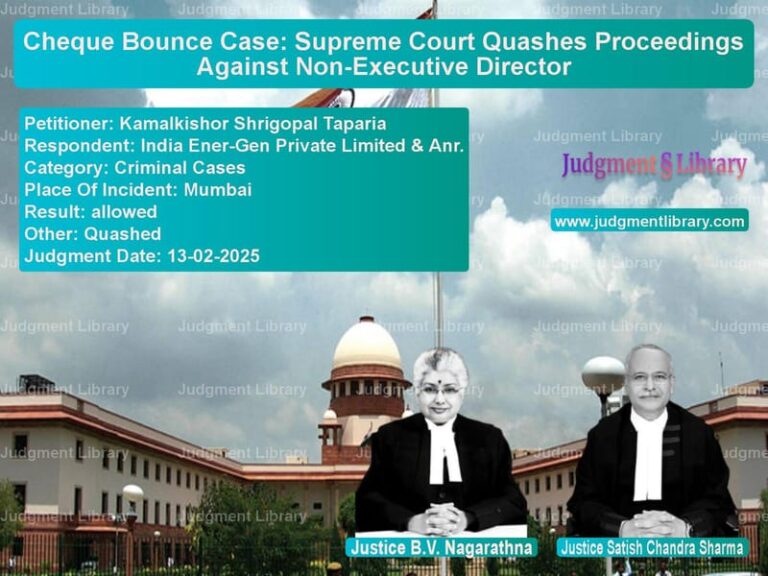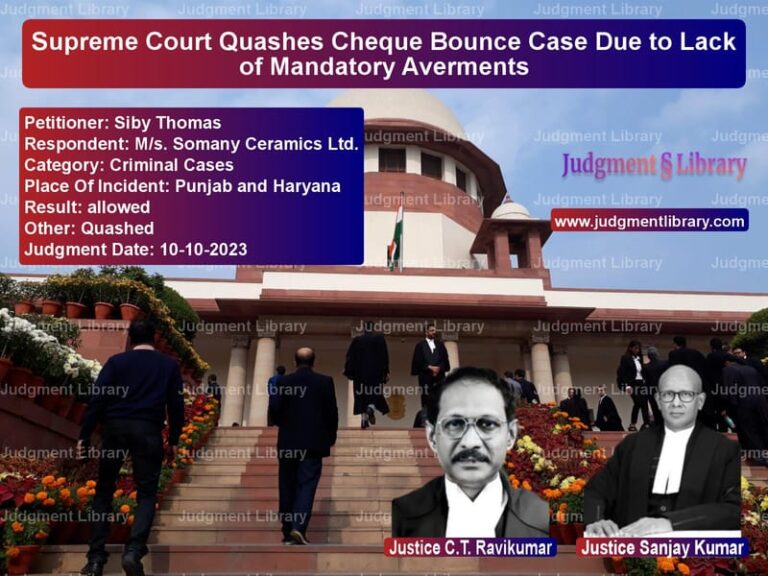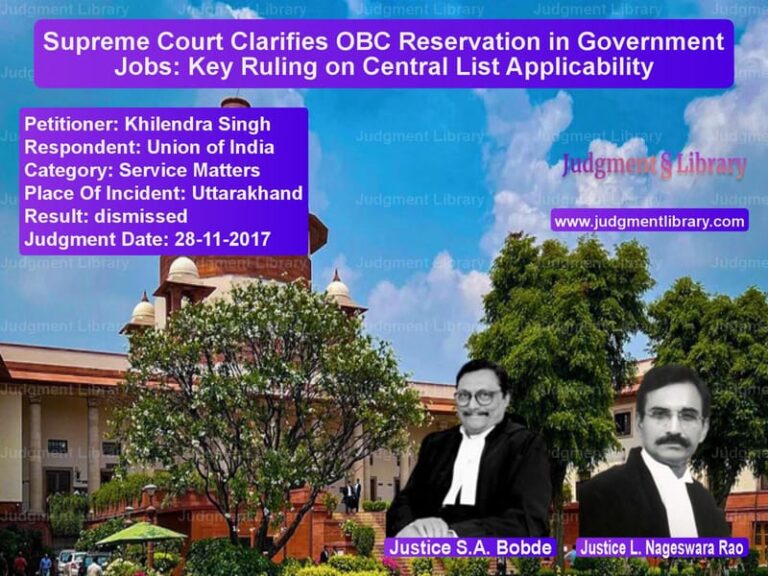Appeal Dismissed in Property Succession Case Involving Hindu Succession Act
This case arises from a dispute regarding the ownership of property belonging to Bhana, the deceased, and involves the claim of his daughter Ajit Kaur (the appellant) and other family members. The original dispute centers on a gift deed executed by Bhana in favor of his second wife Smt. Banti and the subsequent inheritance rights after his death. The appellant contests the will of Bhana, which excludes her and her mother from inheriting the property. The case touches upon key legal aspects of the Hindu Succession Act, 1956, and reversionary rights in property inheritance.
Background of the Case
The dispute began when Bhana, the original owner of the property, passed away on March 27, 1973. Prior to his death, Bhana had executed a will on January 5, 1973, leaving his property to his children from his first marriage—Darshan Singh and others—while excluding his second wife, Smt. Banti, and their daughter, Ajit Kaur (the appellant). The appellant contested the will, arguing that she had a right to the property as the daughter of Bhana.
The property in question had been transferred to Smt. Banti through a gift deed in 1950, which was intended for her maintenance. However, after Bhana’s death, the plaintiffs, who were his children from his first marriage, filed a civil suit for possession, claiming that the gift deed did not affect their reversionary rights to the property. The trial court ruled in favor of the plaintiffs, but the appellant contested the decision, arguing that the gift deed was valid and that she was the rightful owner of the property.
The High Court upheld the decision of the lower courts, affirming the plaintiffs’ right to the property. The appellant then appealed to the Supreme Court, challenging the validity of the gift deed and the will, as well as the ruling on reversionary rights under the Hindu Succession Act, 1956.
Key Arguments of the Parties
Appellant’s Arguments
- The appellant contended that Smt. Banti, Bhana’s second wife, was the absolute owner of the property, and that the gift deed executed in 1950 was valid. She argued that after the enforcement of the Hindu Succession Act, 1956, Smt. Banti’s rights over the property were not extinguished.
- The appellant also argued that the reversionary rights of Darshan Singh and other plaintiffs should not affect her ownership, as she was legally entitled to inherit her father’s property.
- Furthermore, the appellant contested the validity of the will executed by Bhana on January 5, 1973, which excluded her from the inheritance. She claimed that the will should be set aside as it was executed under pressure and did not accurately reflect Bhana’s intentions.
Respondent’s (Plaintiffs’) Arguments
- The plaintiffs, on the other hand, argued that the will executed by Bhana on January 5, 1973, was valid and should be upheld. The will clearly excluded the appellant and her mother from the inheritance of the property.
- They further contended that the gift deed executed in 1950 was not valid in law as it did not transfer full ownership of the property to Smt. Banti. Instead, it only gave her a limited right over the property for maintenance, which ceased upon Bhana’s death.
- The respondents also argued that the appellant could not claim ownership of the property as the Hindu Succession Act, 1956, was applicable, and the reversionary rights of the plaintiffs took precedence in this case.
Supreme Court’s Analysis
The Supreme Court, in its judgment, focused on several key legal issues, particularly the applicability of the Hindu Succession Act, 1956, and the rights of the appellant under the will and the gift deed.
First, the Court addressed the validity of the gift deed executed in 1950 by Bhana in favor of Smt. Banti. The Court noted that the gift deed was intended to provide maintenance to Smt. Banti during Bhana’s lifetime, but it did not confer full ownership of the property to her. The Court emphasized that under the Hindu Succession Act, 1956, a widow who receives property for maintenance cannot claim absolute ownership, and her rights were limited to her lifetime.
Next, the Court examined the will executed by Bhana in January 1973. The Court found that the will was a valid testamentary document and accurately reflected Bhana’s intentions to bequeath the property to his children from his first marriage, excluding Smt. Banti and the appellant. The Court ruled that the will was legally binding and upheld the plaintiffs’ entitlement to the property.
The Court also addressed the issue of reversionary rights. It concluded that since the gift deed did not transfer full ownership of the property to Smt. Banti, the property was still subject to the reversionary rights of Bhana’s legal heirs. As a result, the Court affirmed the plaintiffs’ right to claim the property, as they were the legitimate heirs under the Hindu Succession Act, 1956.
Judgment
The Supreme Court dismissed the appellant’s appeal, upholding the decision of the High Court and affirming the plaintiffs’ right to the disputed property. The Court ruled that the gift deed executed by Bhana in favor of Smt. Banti did not grant her full ownership of the property and that the reversionary rights of the plaintiffs took precedence. The will executed by Bhana on January 5, 1973, was upheld as valid, and the Court reaffirmed the plaintiffs’ entitlement to the property as per the provisions of the Hindu Succession Act, 1956.
The Court further emphasized that the appellant’s claim to the property was not valid, as she was excluded from the inheritance under the will and did not have any legitimate right to challenge the will or the reversionary rights of the plaintiffs.
Conclusion
This case underscores the importance of the Hindu Succession Act, 1956, in determining property rights and the succession of ancestral property. The judgment reaffirms that the reversionary rights of legal heirs take precedence over claims based on gifts or wills executed by the deceased. The Court’s ruling clarifies the limits of rights conferred by a gift deed and emphasizes the validity of a will in determining the distribution of property among heirs.
The Supreme Court’s decision in this case provides a clear legal precedent for similar property disputes involving the application of the Hindu Succession Act and the validity of wills executed by deceased individuals.
Petitioner Name: Ajit Kaur @ Surjit Kaur.Respondent Name: Darshan Singh (Dead) Through LRs..Judgment By: Justice A.M. Khanwilkar, Justice Ajay Rastogi, Justice Rastogi.Place Of Incident: Punjab and Haryana.Judgment Date: 04-04-2019.
Don’t miss out on the full details! Download the complete judgment in PDF format below and gain valuable insights instantly!
Download Judgment: Ajit Kaur @ Surjit K vs Darshan Singh (Dead) Supreme Court of India Judgment Dated 04-04-2019.pdf
Direct Downlaod Judgment: Direct downlaod this Judgment
See all petitions in Property Disputes
See all petitions in Succession and Wills
See all petitions in Specific Performance
See all petitions in Judgment by A M Khanwilkar
See all petitions in Judgment by Ajay Rastogi
See all petitions in Judgment by Ajay Rastogi
See all petitions in dismissed
See all petitions in supreme court of India judgments April 2019
See all petitions in 2019 judgments
See all posts in Civil Cases Category
See all allowed petitions in Civil Cases Category
See all Dismissed petitions in Civil Cases Category
See all partially allowed petitions in Civil Cases Category

